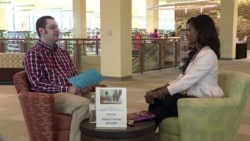There are many ways to access reading material today — as digital e-books, on audio, and, of course, on paper. But there’s another option at Gum Spring Public Library in Loudoun County, Virginia. There, patrons can check out human books.
And instead of flipping pages, a "reader" has 20 minutes to talk with the human book, ask questions and learn the story.
Writer and Human Book, Maimah Karmo, is founder of Tiger Lily Foundation, which supports younger women as they deal with a breast cancer diagnosis.
At the age of 32, Karmo was diagnosed with breast cancer. She was 23 years old when she became a single mother of a 3-year-old daughter. Karmo had immigrated to the U.S. from Liberia at age 15, during the civil war in her native country. So she has lots of stories to share in the book she wrote, and orally — as she herself becomes a book, which she finds more intimate.
“You get to see the person for who they really are beyond just the book cover,” Karmo says. “When somebody is talking with you, you can open the pages of their lives and share that. It's just magical to me.”
New way of learning
Dennis Fargo, a human library reader, agrees. “I think facts come quicker and being present to see facial expression and non-verbal’s from the book is richer experience than just turning a page.”
He's 'checked out' Bobbi Carducci, author of the memoir, Confessions of an Imperfect Caregiver. As a human book, she recounts caring for her father-in-law, who had dementia for the last seven years of his life.
“During that time I was having migraines,” Carducci recalls. “I was having panic attacks. My hair was falling out. There were days where I was going without sleep as he was as well.”
Carducci says she likes sharing her experience with others.
“Almost everyone I speak to is either experiencing caregiving or knows someone who is,” she says. “It's extremely difficult for caregivers and it impacts entire families. This is probably one of the most difficult things you would do ever in your life because it’s so unpredictable. But it’s also a gift. The moments that you have with your family members and those who you love so much when they’re going through such a difficult time, and experiencing even the moments of clarity that come within it, is absolutely precious.”
Carducci’s story resonates with Fargo.
“I had the guilt that she suffered about that I should have been a caregiver and wasn’t,” Fargo says. “Because when my mother had the final chapters of her life I was 300 miles away. It was my sister who had the burden of caregiving in our family and what help I could give my sister was to pick up the phone and call. I never felt that I was doing what I could.”
From Europe to the US
Gum Spring's Human Library was inspired by a similar program Linda Holtslander discovered in Helsinki.
The library system administrator says the program was originally launched in 2000 in Denmark as a way to help Danes adjust to rapid increases in immigration. The idea was to bring neighbors together so they could get to know each other beyond stereotypes. Sharing emotions and thoughts Holtslander says, brings community members closer together.
“I just thought it was such an amazing opportunity for people to actually meet and have a conversation,” she says. “They are all individuals with a lot to learn from one another.”
Human books are required to attend training sessions before they make their debut. Among the first 'books' offered so far, an Iraqi refugee, a natural healer, a ghost hunter and an e-voting expert at Google.
The program has proven to be very popular, according to librarian Carolyn Reagle.
“We’ve got a lot of great feedback; people have told us this is the best library program they’ve ever been to," Reagle says. “We've gotten suggestions on other books to try for next year. People have recommended friends or people that they know. Most people say that this is a touching program, this is very different.”
Reagle says she would like to see this creative, interactive program available all over the country.







